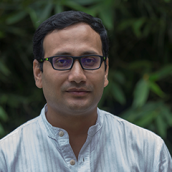What is OPM looking to learn at COP25?
Our climate change experts discuss key priorities and share their expectations from the global climate change conference
-
Date
December 2019
-
Areas of expertiseClimate, Energy, and Nature , Cross-cutting themes
-
CountriesIndia , Nepal
-
KeywordsClimate policy and finance , Disaster risk , Energy, resources and growth , Climate change adaptation , Climate change mitigation , Climate governance , COP , Green growth and investment , Renewable energy , Office of the Chief Economist , Adaptive management , Technical assistance
-
OfficesOPM India , OPM Nepal
At the start of the 25th Conference of the Parties (COP25) to the United Nations Framework Convention on Climate Change, listen to Elizabeth Gogoi, Soumik Biswas, Shivaranjani Venkatramani, and Bimal Regmi share their views on what a successful COP meeting would look like and what key messages they would like to share with policymakers attending COP.
[button-link text="Don't miss our COP25 coverage" link="https://www.opml.co.uk/cop25"]
Continue reading for transcript
Elizabeth Gogoi: The world is looking to see that the governments are responding to the heightened public concern on climate change. You see this in the UK, US, and in Europe, with various different movements, from extinction rebellion to student protests, really demanding a much greater level of ambition. Governments need to show they are in step with public opinion in different ways, either by committing higher level of targets, speeding up implementation, and speeding up financing, to show that they are responding.
I’m sitting in Delhi, India, right now in the middle of pollution season. Every year in the north of India, it’s not just isolated to sort of Delhi and the big metros, but across the entire northern plain of India, as the weather drops in autumn/winter time, we have crippling levels of air pollution. Where the safe limit of air quality index is 50, in Delhi we’ve been seeing it up to 800, 900. That is the maximum our monitors can read. It really is a health emergency and something we are all struggling to cope with. While the Government is reacting to those challenges, everybody recognises the need for a more concerted effort in dealing with the causes of air pollution. That is a highly connected issue to climate change – many of the sources of air pollution, such as diesel cars, coal-based power plants, are also contributing to greenhouse gas emissions, carbon dioxide, and climate change.
Soumik Biswas: One of the key thematic areas of this year’s COP is on climate finance, as well as on transparency in climate actions. These are two very important areas in the climate change activity phase, the obvious point is that we need the finance for moving along a lot of these climate actions. We attended the Asia-Pacific Climate Week in Bangkok, where the technical expert meeting was held on climate finance on adaptation. More and more focus is on how to integrate climate change into the budgeting process of the governments around the world. The second part would be more transparency in climate actions moving forward. One thing is pretty clear now – we have three silos that are operating in all the countries, one is the nationally determined contributions (NDCs), they have their own pathway; then there are the Sustainable Development Goals (SDGs), which somewhat match with the NDCs, but not entirely; and then there are other climate change action plans. We need is to bring all these three together, [and provide] more coherence between SDGs, NDCs, and climate actions.
Shivaranjani Venkatramani: For me, the successful COP meeting would mean that the outcome of discussions resonates back home. More specifically, what I would like to see as a person who works on both climate policy and climate finance, is that there is a rather short to medium-term impact on the way governments are spending and reporting on their spending to their citizens and to the global community, particularly on the climate-relevant achievements. I would like to see COP take a turn towards creating and requiring stronger structures of pulling all of this domestic information together.
Bimal Regmi: This COP is really important in terms of key priorities to deliver and increase ambition on the new and updated NDCs by early 2020, this is really important in terms of putting the Paris agreement into implementation. Another issue that is quite important to reach at COP25 is robust Article 6 rules on markets that would ensure environmental integrity and mitigate global emissions.
Another very important issue, which has not progressed well in other COPs, is the experience for Least Developed Countries (LDCs) and mostly developing countries, is to strengthen action-oriented Warsaw International Mechanism for Loss and Damage.
Elizabeth Gogoi: There are various different agenda items for COP. Something I’m personally very interested to see is what rules they agree on carbon markets. We have a lot of learning from previous climate regimes in terms of what sort of carbon credit mechanism works and what are the challenges. We are all very concerned to make sure whatever is agreed at COP is robust, it doesn’t allow the governments to outsource their emissions, and that there isn’t double counting, but it actually allows a transfer of technology and climate finance from industrialised countries to developing countries.
Soumik Biswas: We have always looked at climate action as separate from development activities. The questions has always been for developing nations that development comes first, climate change action comes later. My message to policymakers would be it’s far too late now, and we need to actually think of climate actions as development actions. Because what we are seeing is that development planning that governments are doing is not getting the actual results, because the climate change angle is not being integrated into the planning process. It is high time that policymakers think about climate sensitised development planning, rather than doing development planning separately and climate change planning separately.
Shivaranjani Venkatramani: Right now, there is a lot disparity in the way countries are reporting on their achievements and how this information is being interpreted. This may seem like a very fundamental and background level activity, but when you think of implication of all of this becoming building blocks to a rather international representation of national level commitments and contributions, then it is something that the global community, as well as individual national governments, should take a lot of serious steps towards. That is one very important thing that I would be very keen to look forward to seeing – how, on annual or bi-annual basis, country governments are seriously linking their actions and reporting them in a very credible manor to their own citizens, as well as the global community.
Bimal Regmi: Policymakers and other delegates from the least developed countries, like Nepal, they have to be very active, vigilant, and decisive towards pushing the decision on some of the things that are a priority in this COP, like whether to give the Warsaw International Mechanism for Loss and Damage a new mandate. The mandate should also explore arranging funding for loss and damage that is separate from adaptation funding and providing compensation to the victims of human induced climate change. The loss and damage at centre of the negotiations hasn’t yet been solved, so policymakers and other delegates have to push for this.



